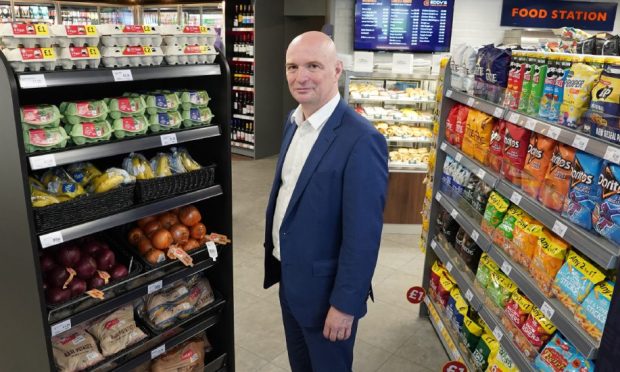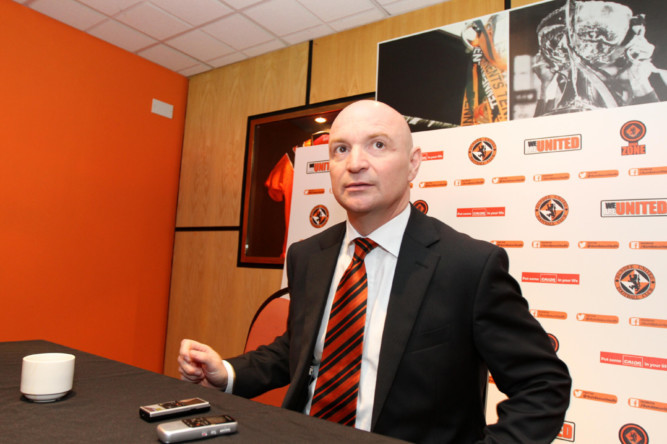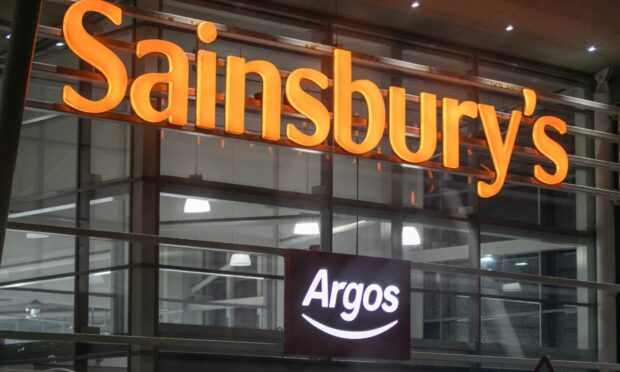A convenience store chain set up by former Dundee United chairman Stephen Thompson owed millions of pounds when it collapsed into administration.
Eddy’s Food Station was set up in 2022 with ambitions to grow to 50 shops and 800 staff within five years.
The company’s name was a tribute to Mr Thompson’s late father Eddie, who built the Morning Noon & Night chain of shops.
Eddy’s Food Station grew to have six shops – including locations in Ceres, Leuchars and Buckhaven in Fife – though just three outlets remained at the time of collapse.
Mr Thompson previously told The Courier “no banks would speak to him” as the company failed.
Cut off from suppliers due to unpaid bills
The new report from administrators FRP shows the scale of the company’s problems ahead of their appointment on April 25.
It said the company had “paid premiums” to secure leases as it built up its portfolio of six stores and had also incurred “substantial” refurbishment costs.
“These costs, coupled with operational issues, resulted in losses being incurred at three of the sites,” the report states.
“As a result, we understand three of the sites were sold at a substantial discount.
“The company has struggled with high debt servicing costs and had experienced cash flow pressures caused by high investment costs and lack of profitability.”
Financial statements for the year ending June 2023 showed the company had turnover of £5.7 million but a net loss of £1.45m.
The administrators said the financial problems escalated in March this year when main supplier, Costcutter, stopped supplying the business as a result of unpaid debts.
The three remaining shops – in Leuchars, Greenock and Larbert – continued to trade via cash and carry purchases together with cash on delivery arrangements with other suppliers.
The report adds: “Whilst the business was able to trade on in a limited fashion this was suboptimal, further eroding sales margin and crucially the cash position was becoming critical.
“At that point the company and secured creditor sought advice regarding the cash flow issues.”
Stephen Thompson convenience store debts
Administrators FRP started an accelerated sales process for the three Eddy’s shops prior to the company going into administration.
A total of 11 offers were received with the highest offer for the stores coming from Dundee-based CJ Lang, who initially offered £1.6m.
This offer, which included equipment, leasehold interests and stock, was subsequently reduced to £1.5m due to delays. This sale completed on April 26.
The administrators said the extent of debts in the company meant a sale as a going concern was impossible because “the company did not have sufficient working capital to trade in the short term and insufficient assets to liquidate to satisfy creditor demands”.
The report added: “The sale price was the best reasonably obtainable in all the circumstances and was considered to be in the overall best interests of all creditors of the company.”
From the sale price, £215,000 was paid to landlords to agree the assignation of the relevant leases.
Meanwhile, Stephen Thompson, the company’s sole director, has been given a payment of £40,000 as his employment was terminated.
The net realisations from the sale of the three shops after solicitor’s fees of £1,238,181 will only go a small way to cover the company’s debts.
Finance firm Nash Business Services Limited is owed £3.8 million, HMRC is due £141,019 and amounts due to unsecured creditors is estimated at £555,459.
The administrators added: “Total realisations would not be sufficient to repay the secured creditor in full in order to permit a distribution to the unsecured creditors.”
Stephen Thompson statement
Responding to the administrator’s report, Mr Thompson said he had invested his entire pension pot – a six figure sum – into the business.
He said the report also didn’t reflect “personal guarantees” made by family members.
He said: “The business started out in an incredibly challenging time with energy costs and the huge level of food inflation making it hard to produce the profits required to cover the servicing costs of the debt.
“The huge energy costs in 2023 were £184,000 above budget which came straight from working capital.
“Personally I invested my total pension pot so that’s now gone.
“My family have personal guarantees in place for part of the debt which isn’t reported (by the administrators) and face legal action in relation to this.”













Conversation